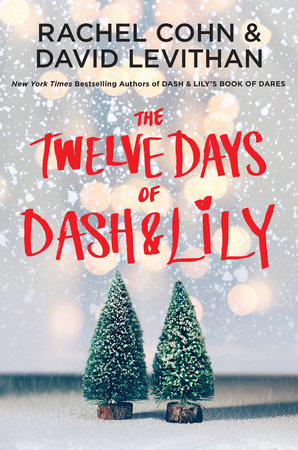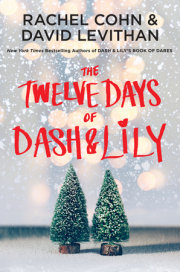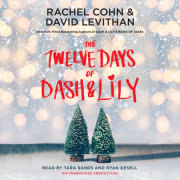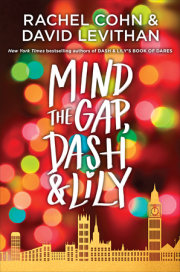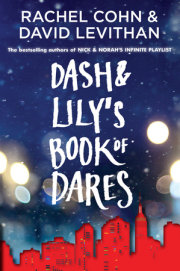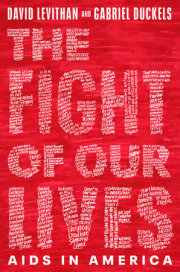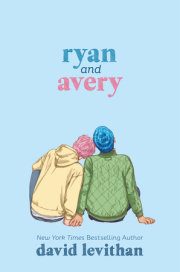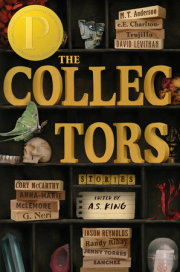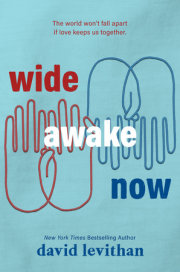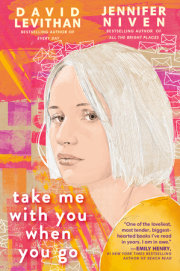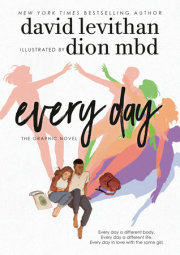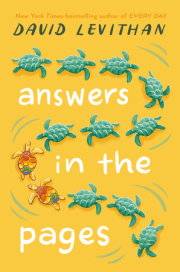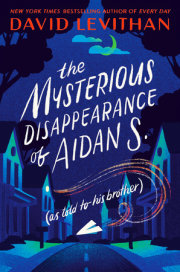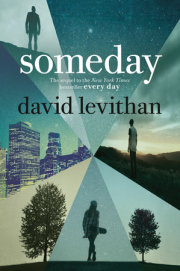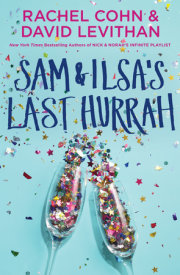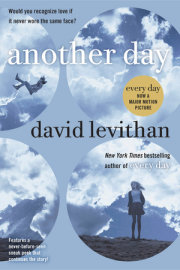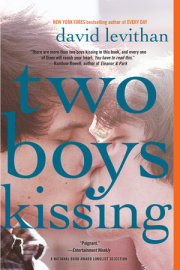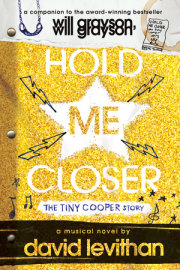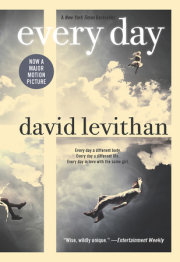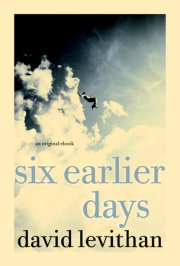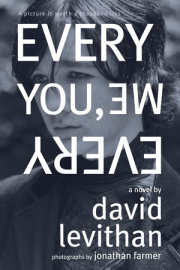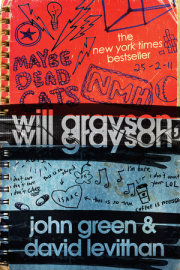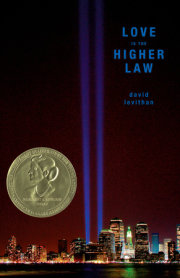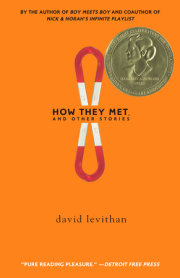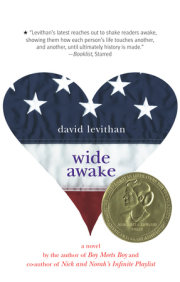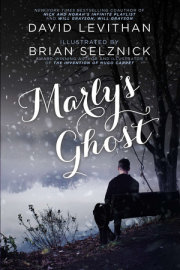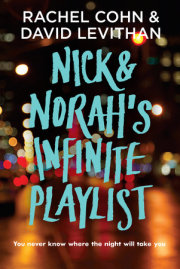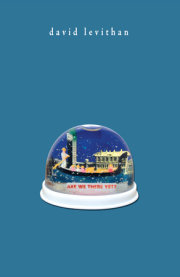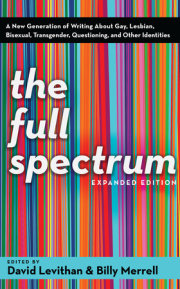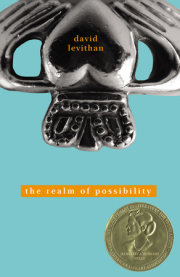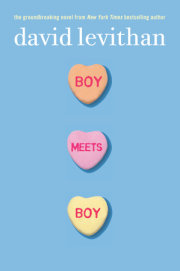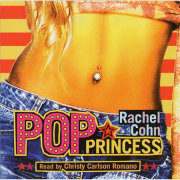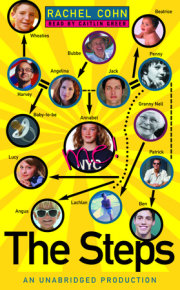One
DASH
A Pear in a Partridge Tree
Saturday, December 13th
I had been dating Lily for almost a year, and no matter what I did, I couldn’t get her brother to like me, trust me, or think I was remotely good enough for his sister. So it was a shock when he told me he wanted to meet for lunch, just the two of us.
Are you sure you have the right number? I texted back to him.
Don’t be a dick. Just show up, he replied.
The scary thing was, as much as I was trying to deny it, I knew why he wanted to meet, and what he wanted to talk about.
He wasn’t right about me, but he was right that there was a problem.
It had been a hard year.
Not at the start. The start had me clutching for such plebeian terms as awesome! and super! Because Christmas and the new year brought me something other than the usual consumerism and post-consumerism depression. The start of this year brought me Lily—bright, believing Lily. She was enough to get me to give credence to the notion of a benevolent fat guy in a red suit and a turbo-jacked sled. She was enough to make me feel cheer when Father Time turned over the keys to a newborn and said, Here, drive this. She was enough to turn me a little cynical about my own cynicism. We started the year making out in the rare-book room of the Strand, our favorite bookstore. It appeared to be an augur of good things to come.
And it was. For a time.
She met my friends. It went well.
I met many members of her seemingly infinite family. It went passably.
She met my parents and stepparents. They were confused by how their dark cloud of a son could have brought home such a sunbeam. But they weren’t complaining. They were, in fact, a little in awe, to a degree that New Yorkers usually reserve for the perfect bagel, a fifty-block cab ride with no red light, and the one movie out of every five that Woody Allen aces.
I met her beloved grandpa. He liked my handshake, and said that was all he really needed to know about me in order to approve. I sought more approval anyway, because this was a man whose eyes sparkled when he recounted a ball game played fifty years ago.
Langston, Lily’s brother, needed more convincing. Mostly, he left us alone. I didn’t mind. I wasn’t dating Lily to be with her brother. I was dating Lily to be with Lily.
And I was with Lily. We didn’t go to the same school or live in the same neighborhood, so we made Manhattan our playground, gamboling through the frostbitten parks and taking refuge in Think coffee shops and every available screen at the IFC. I showed her my favorite corners of the New York Public Library. She showed me her favorite dessert at Levain . . . which was basically all of them.
Manhattan didn’t mind our wanderings one bit.
January turned to February. The cold started to seep into the city’s bones. Smiles were harder to come by. The snow that dazzled as it fell grew less and less welcome as it stayed. We wandered around in layers, unable to feel anything firsthand.
But Lily—Lily didn’t mind. Lily was mittens and hot chocolate and snow angels that lifted from the ground and danced in the air. She said she loved winter, and I wondered if there was any season she didn’t love. I worked hard to accept her enthusiasm as genuine. My mental furnace was built for immolation, not warmth. I didn’t understand how she could be so happy. But such was the love I had fallen into that I decided not to question it, and to live within it.
Then.
Two days before her birthday, in May, I was asking my best friend, Boomer, for help in knitting her a red sweater. I was discovering that no matter how many YouTube videos you watch, there is no way to knit a red sweater in a single afternoon. The phone rang and I didn’t hear it. Then the phone rang and my hands were occupied. It wasn’t until two hours later that I saw how many messages I had.
Only when I listened did I learn that her beloved grandpa had suffered a minor heart attack with particularly bad timing, striking as it did while he was walking up the stairs to their apartment. He fell. And fell. And lay there for at least a half hour, barely conscious, until Lily got home and found him. The ambulance took a decade of minutes to get there. As she watched, he slipped under. As she watched, they revived him. As she waited, unable to watch, he teetered, until he barely landed on the right side of living.
Her parents were in a foreign country. Langston was in class, where he wasn’t allowed to look at his phone. I was too busy knitting her surprise present to notice she was calling. She was alone in the waiting room of New York–-Presbyterian, about to lose something she’d never even begun to consider that she’d one day lose.
Grandpa lived, but it took him a very long time to recover. He lived, but many of the steps were painful. He lived because she helped him live, and that helping took its toll. To have him die would have been awful, but to see him continually suffer, continually frustrated, was almost as bad.
Her parents came home. Langston offered to take time off from college. I tried to be there. But this was hers. Grandpa was her responsibility; she wouldn’t have it any other way. And he was in too much pain to argue. I couldn’t even say I blamed him—of any of us, she’s the one I’d want to be the one to help me walk again. She’s the one I’d want to lead me back into life. Even if life did not feel, to her, as full of splendor as it had before.
It’s always the ones who believe who are hurt the most when things go wrong. She didn’t want to talk about it, and I didn’t have the vocabulary to make her see it differently. She said she wanted me to be the place she escaped to, and I was flattered by that. I was supportive, but it was the passive support of a chair or a pillar, not the active support of a human being holding another human being upright. As her grandfather was in and out of hospitals for operations and complications from operations, in and out of physical therapy, she and I spent less time with each other—less time wandering the city, less time wandering the corners of each other’s thoughts. Exam time passed in a blink—then came summer. She got a job as a volunteer at the rehabilitation clinic her grandfather was going to, just to be with him more, and to help other people who needed it like he did. I felt guilty because I spent the same period shuttling between vacations with my respective parents, my father trying to outdo my mother’s Montreal trip with an ill-begotten jaunt to Paris. I wanted to yell at my father for taking me to Paris, then realized what a brat I sounded like, yelling at my father for taking me to Paris. Mostly, I wanted to be away from him, and home with Lily.
Things were better with the new school year. Grandpa was walking again, was starting to shoo Lily away for her own good. I thought she’d be relieved. She acted like she was relieved, but there was still a part of her that was afraid. But instead of questioning it, I went along, thinking if we pretended all was well, there would come a moment when it would switch the groove from being a half lie to being a more-than-half truth, and then ultimately it would be the whole truth.
It was easy to think that we were back to normal, with school in full swing and all of our friends around. We had plenty of good times, able to wander the city and forget the city at the same time. There were places within her I wasn’t reaching, but there were plenty of other places I could reach. The part of her that laughed at the way certain dog owners looked like their dogs. The part of her that cried at TV shows where restaurants were brought back from the brink of being condemned. The part of her that kept a bag of vegan marshmallows in her room for whenever I came over, just because I once told her how much I liked them.
It was only when Christmas came closer that the cracks began to show.
It used to be that the Christmas season would shrink my heart to the size and substance of a gift card. I hated the way the streets would clog with a thrombosis of tourists, and how the normal thrum of the city would be drowned out by tinny cliché sentiments. Most people counted down the days till Christmas in order to get their shopping done; I counted them down in order to get Christmas over with, and for the bleaker, more genuine winter to begin.
There’d been no room in my toy-soldier heart for Lily, but she’d forced herself in anyway. And she’d brought Christmas with her.
Now, don’t get me wrong—it still struck me as pretty bogus to pay lip service to generosity at the end of every year only to go all generosity amnesiac once the calendar page turned. The reason Lily wore it well was because she wore her kindness all year round. And now I was able to see it in other people, too—as I sat waiting for Langston at Le Pain Quotidien, I saw this perpetual generosity in the way some of the couples looked at each other, and a lot in the way that most of the parents (even the exasperated ones) looked at their children. I saw pieces of Lily everywhere now. I’d just seen fewer of them in Lily lately.
Clearly I wasn’t the only one, because the moment Langston sat down, he said, “Look, the last thing I particularly want to do is break bread with you, but we’ve got to do something, and we’ve got to do something right away.”
“What’s happened?” I asked.
“There are twelve days left until Christmas, right?”
I nodded. It was, indeed, the thirteenth of December.
“Well, with twelve days left until Christmas, there is a big gaping hole in our apartment. You know why?”
“Termites?”
“Shut up. The reason there’s a big gaping hole in our apartment is because we don’t have a Christmas tree. Lily usually can’t wait until Thanksgiving leftovers are through before running out and getting a tree—she feels that in this city, all the good ones are taken early, and the longer you wait, the more likely you are to get a tree that isn’t worthy of Christmas. So the tree is up before the first of December, and then she spends the next two weeks decorating. On the fourteenth, our family has a big tree-lighting ceremony—Lily acts like it’s an age-old family tradition, but the truth is, she started it when she was seven years old, and now it just feels like an age-old family tradition. Only, this year—nothing. No tree. All the decorations are still in boxes. And the tree lighting is supposed to be tomorrow. Mrs. Basil E. has already ordered the catering—and I don’t know how to tell her that there isn’t a tree to light.”
I understood his fear. The minute their great-aunt—who we all called Mrs. Basil E.—opened the door to their apartment, she’d be able to smell the lack of a tree, and would not hide her displeasure at the breach.
“So why don’t you just get a tree?” I asked.
Langston actually smacked his forehead in amazement at my daftness. “Because that’s Lily’s job! That’s what Lily loves to do! And if we get it without her, it’s like we’re pointing out that she hasn’t done it, and that will only make her feel worse.”
“True true true,” I said.
The waitress came, and we ordered pastries—I think we both knew we didn’t have enough conversation within us to sustain a proper meal.
Once we’d ordered, I continued. “Have you asked her about the tree? I mean, about getting one?”
“I tried,” Langston said. “Point blank—‘Hey, why don’t we get a tree?’ And do you know what her response was? ‘I’m just not feeling it right now.’ ”
“That doesn’t sound like Lily at all.”
“I know! So I figured desperate times called for desperate measures. Which is why I texted you.”
“But what can I do?”
“Has she talked to you about it at all?”
Even in our conversational détente, I didn’t want Langston to know the whole truth—that Lily and I hadn’t talked about very much in the weeks since Thanksgiving. Every now and then we’d go to a museum or get dinner. Every now and then we’d kiss, or lightly make out—but nothing that would be out of place on CBS. Ostensibly, we were still dating. But the dating was feeling rather ostensible.
I didn’t tell this to Langston because I was embarrassed that I’d let it happen. And I didn’t tell this to Langston because I was worried it would alarm him. My own alarms were the ones that should’ve been going off.
So instead of getting into it, I said, “No, we haven’t talked about the tree.”
“And she didn’t invite you to the tree-lighting ceremony?”
I shook my head. “This is the first I’m hearing of it.”
“I thought so. I think the only people who are planning to come are the family members who come every year. Usually Lily hands out invitations. But I guess she just wasn’t feeling that, either.”
“Clearly, we have to do something.”
“Yes, but what? It really feels like it would be a betrayal if I went out and bought a tree.”
I thought about it for a moment, and something came to me.
“But what if there’s a loophole?” I asked.
Langston cocked his head, looked at me. “I’m listening.”
“What if I got her the tree? As a present. Part of my Christmas present to her. She doesn’t know that I know about your family tradition. I could just bluster and bluff my way into it.”
Langston didn’t want to like the idea, because it would mean liking me, at least for a minute. But his eyes kicked in with a gleam that, for a moment, countered his doubt.
Copyright © 2016 by Rachel Cohn. All rights reserved. No part of this excerpt may be reproduced or reprinted without permission in writing from the publisher.

